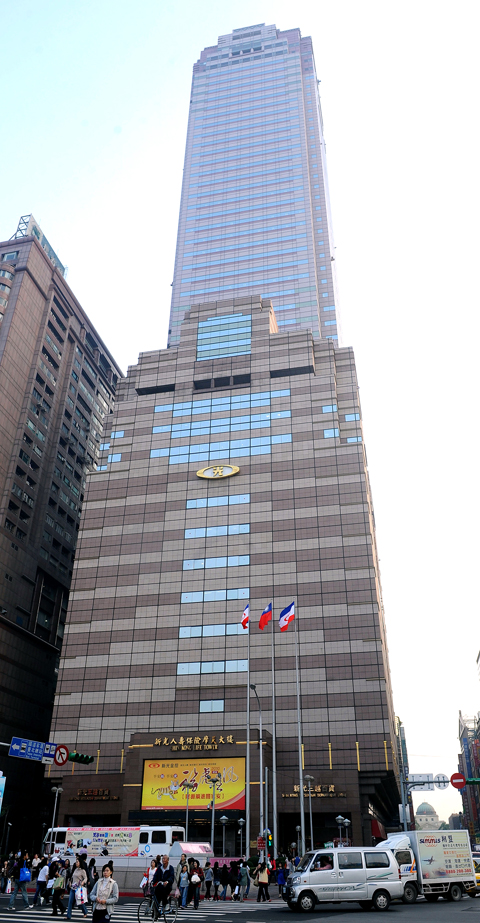Shin Kong Life Tower (新光摩天大樓), located across Zhongxiao W Rd from Taipei Railway Station, continued to top the capital’s skyscrapers this year with the highest government-assessed land price.
The building’s land price was NT$3.36 million (US$103,867) per ping (3.3m²), up 0.41 percent from last year, the Taipei City Government said yesterday.
The high-rise building retained its “King of Land” title for the 12th consecutive year, the Taipei City Land Department said in an annual press conference.

PHOTO: WANG MIN-WEI, TAIPEI TIMES
The department attributed the rise in the 51-story skyscraper’s land price to the opening of Taipei Bus Station in mid-August, construction of the airport express, its floor-to-area ratio of 1,600 percent and a proposal for twin tower buildings nearby, attracting bigger crowds and more business.
The land price of Shin Kong Life Tower was followed by Taipei 101 at NT$3.07 million per ping, the land department said.
The Xinyi District (信義) skyscraper’s land price was up 1.98 percent year-on-year. Taipei 101 has a lower floor-to-area ratio than the Shin Kong building at 710 percent, the department said.
Huang Rong-feng (黃榮峰), commissioner of the department, said Taipei 101 would continue to increase in value as a result of rapid development in the district and the completion of the Xinyi MRT line in 2012.
Chiu Tai-hsuan (邱太), a real estate analyst at Taiwan Realty Co (台灣房屋), forecast that Taipei 101 would quickly catch up and overtake the Shin Kong building in 2015 given the district’s rapid development.
He said in a statement yesterday that the land price of Taipei 101 had risen 3.25 percent in the past eight years, outperforming Skin Kong Tower’s 0.49 percent increase.
The department is expected to release its list of land prices on Jan. 1, which will be used for the city’s property owners to file for their land value taxes next year.
On average, the city’s land prices for next year will rise by 2.12 percent from this year — the smallest increase since 2005 and slightly smaller than the annual increase of 2.61 percent seen this year.
Huang said the financial crisis and the poor performance of the real estate market both contributed to the slow growth of real estate prices.
Well-planned public infrastructure, convenient transportation and a great business location attributed to the city’s land price gain amid the nation’s earlier property slump, the department said.
Among the city’s 12 administrative districts, Neihu District (內湖) saw the biggest jump in land prices at 2.89 percent year-on-year as more businesses move there and transportation improves.
Neihu was followed by Da-an (大安) and Zhongzheng (中正) districts, the department’s figures showed. The commercial area in Tianmu (天母), however, was hit by the economic slowdown, showing a slight drop in land prices.
Huang said the city’s land prices were calculated by collecting information from real estate agencies and land acquisition companies as a reference for the next year’s market prices.

Semiconductor shares in China surged yesterday after Reuters reported the US had ordered chipmaking giant Taiwan Semiconductor Manufacturing Co (TSMC, 台積電) to halt shipments of advanced chips to Chinese customers, which investors believe could accelerate Beijing’s self-reliance efforts. TSMC yesterday started to suspend shipments of certain sophisticated chips to some Chinese clients after receiving a letter from the US Department of Commerce imposing export restrictions on those products, Reuters reported on Sunday, citing an unnamed source. The US imposed export restrictions on TSMC’s 7-nanometer or more advanced designs, Reuters reported. Investors figured that would encourage authorities to support China’s industry and bought shares

FLEXIBLE: Taiwan can develop its own ground station equipment, and has highly competitive manufacturers and suppliers with diversified production, the MOEA said The Ministry of Economic Affairs (MOEA) yesterday disputed reports that suppliers to US-based Space Exploration Technologies Corp (SpaceX) had been asked to move production out of Taiwan. Reuters had reported on Tuesday last week that Elon Musk-owned SpaceX had asked their manufacturers to produce outside of Taiwan given geopolitical risks and that at least one Taiwanese supplier had been pushed to relocate production to Vietnam. SpaceX’s requests place a renewed focus on the contentious relationship Musk has had with Taiwan, especially after he said last year that Taiwan is an “integral part” of China, sparking sharp criticism from Taiwanese authorities. The ministry said

CHANGING JAPAN: Nvidia-powered AI services over cellular networks ‘will result in an artificial intelligence grid that runs across Japan,’ Nvidia’s Jensen Huang said Softbank Group Corp would be the first to build a supercomputer with chips using Nvidia Corp’s new Blackwell design, a demonstration of the Japanese company’s ambitions to catch up on artificial intelligence (AI). The group’s telecom unit, Softbank Corp, plans to build Japan’s most powerful AI supercomputer to support local services, it said. That computer would be based on Nvidia’s DGX B200 product, which combines computer processors with so-called AI accelerator chips. A follow-up effort will feature Grace Blackwell, a more advanced version, the company said. The announcement indicates that Softbank Group, which until early 2019 owned 4.9 percent of Nvidia, has secured a

CARBON REDUCTION: ‘As a global leader in semiconductor manufacturing, we recognize our mission in environmental protection,’ TSMC executive Y.P. Chyn said Taiwan Semiconductor Manufacturing Co (TSMC, 台積電), the world’s biggest contract chipmaker, yesterday launched its first zero-waste center in Taichung to repurpose major manufacturing waste, which translates into savings of NT$1.5 billion (US$46 million) in environmental costs a year. The environmental cost savings include a carbon reduction benefit of 40,000 tonnes, equivalent to the carbon offset of over 110 Daan Forest Parks, the chipmaker said. The Taichung Zero Waste Manufacturing Center is part of the chipmaker’s greater efforts to reach its net zero emissions goal in 2050, aligning with the UN’s 12th Sustainable Development Goal. The center could reduce TSMC’s outsourced waste processing